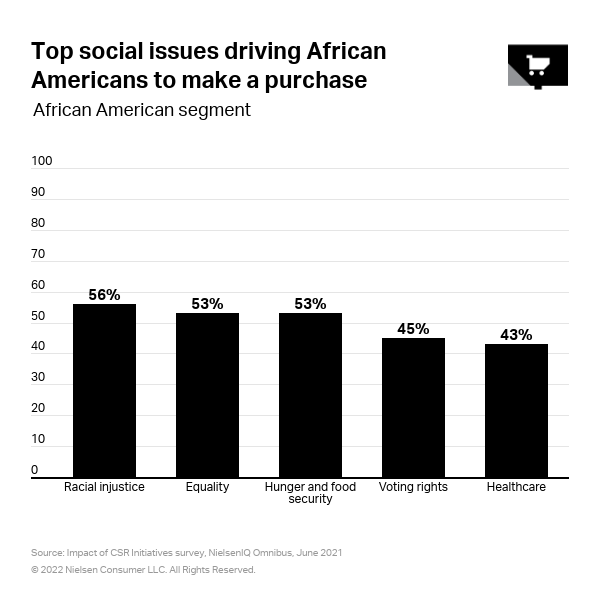The African American population has historically held an extremely powerful position in the retail marketplace, as they have been known to drive trends across food, beauty, media, and more. Their influence will continue to grow as their buying power does – which is projected to reach $1.8T by 2024. Largely driving the expected increase in buying power, the Black population is on track to grow by 22% between 2020-2060, compared to a 27% decrease in the non-Hispanic White population during that same time. With this in mind, retailers and manufacturers need to pay close attention to what is driving this very powerful and rapidly growing segment to make a purchase.
As we reflect on how shopping behaviors have transformed throughout the past unprecedented two years, consumers across all demographics have been shifting towards corporate social responsibility, health and wellness, and omnichannel shopping to varying degrees. Notably, the African American segment has made the greatest strides towards altruistic shopping, defined by NielsenIQ as “selfless consumption that supports environmental, ethical, humanitarian or other philanthropic causes” and are looking to spend their dollars where it truly counts.
The pandemic brought an array of racial disparities to the forefront, particularly for Black consumers, as they dealt with disproportionate COVID-19 infection rates and decreased levels of employment. Given these realities, many consumers were awakened to how their individual purchases can have a positive impact on the world around them, adopting an “if it’s good for we, it’s good for me” mindset. When taking a closer look at the social causes this segment is looking to support with their purchases, African Americans are the most compelled to purchase products and shop from retailers that make efforts towards combatting racial injustice (56%), promoting equality (53%), and fighting hunger and food insecurity (53%).

These common values are not only reflected across Black Americans’ consumption patterns, but also on their social media accounts. Black consumers are known to be highly active on social media platforms, especially Twitter (36.6% of segment), and have proven that they’re quick to use their platforms to speak on social issues that matter to them, in addition to showing support for brands and retailers that reflect their values.
For seemingly the first time, consumers’ voices can no longer go ignored by retailers, brands, and manufacturers, and this is especially apparent for the Black consumer segment – which tends to have a higher rate of social justice advocacy and a broader reach on social media platforms. Our data shows that Black consumers are, overall, much more likely to shop where their dollars count in terms of supporting causes such as racial injustice, equality, and food insecurity, and brands who neglect these consumers’ demands for action will fail to engage this rapidly growing demographic.
Companies that are looking to tap into Black Americans’ wallets must understand what drives these consumers and the strong influence they have in shaping trends. By listening to Black consumers, retailers and manufacturers will be able to develop authentic strategies and, in turn, unlock spend from this highly valuable segment.





